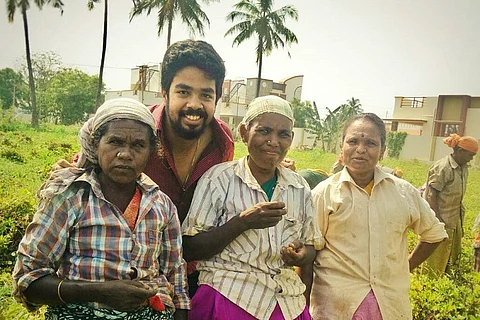

Just two years after he quit his job as an instructional designer at a multinational IT firm, Chennai-based Vishnu Vardhan is engineering a silent organic revolution in the state.
The 27-year-old has started a one of a kind rent-a-farm training programme for people interested in growing their own food in a bid to popularise organic farming.
Vishnu claims that learners will be able to not only recover their course fee at the end of the program but also earn more by selling their crops.
So how did it all start?
It was in October 2015 when Vishnu was working in Bengaluru that he came across the news of many farmers from Mandya committing suicide, and felt the urge to change how the system works.
“On weekends, I would go and talk to farmers and came to know that they were not getting any money for their crops, even though the retail price stayed almost the same. So, I felt the need to eliminate the middlemen from the process. Another problem I heard that farmers were facing was with marketing. So, we enabled them to do some value-addition to their products which ensures additional profits,” says Vishnu.
Before quitting his job, he set up Indian Superheroes (ISH) -a collective of NGOs, Self-Help-Groups working with organic farming, which formed a co-operative for small organic farmers and engaged with inorganic farmers to convert them to what he calls zero-budget integrated organic farming.
What is zero-budget integrated organic farming?
Vishnu says once a farm is free from inorganic pollutants like pesticides and inorganic fertilisers (using a method called mulching), farm waste, cow dung, cow urine and herbs can be used as manure. All of the components that you put into the soil will come from the farm itself so there will be absolutely no cost. It is zero-budget and you don't have to buy anything from outside except seeds.
“Another problem was that there was no separate marketplace for organic products and a small group of organic farmers would sell their crops in the same market,” says Vishnu.
The solution to eliminate middlemen and launch an exclusive organic marketplace kickstarted with the idea of building a website to sell the organic produce but Vishnu had to wait till he could ensure meeting the demand of the customers.
Vishnu claims ISH sells the produce at nominal margins and most of the profits go to the farmer which he can use to provide equipment for farming. So, before setting up the website, they sold their products via offline channels.
The website was finally launched in February 2017, one and a half years after he left his job.
“But online worked much better because the farmers could get better returns,” Vishnu says.
“So, I started with two farmers and Tamil Nadu as my base and then it slowly started growing,” says Vishnu. Vishnu says now his organisation ISH has 823 organic farmer families in its fold.
“I contacted farmers and got them on board convincing we can sell directly to customers to get better returns with no cost of fertilisers and assuring them buy-back guarantees,” says Vishnu.
Convincing inorganic farmers to convert
“But whenever you ask an inorganic farmer to change to organic, he will ask what happens to his income in the meanwhile. So, we tell them to grow spinach or other greens in a small patch of land to sustain themselves,” explains Vishnu.
Once they start the process, whatever they do, it’s a profit for them, claims Vishnu.
“Our prices are higher than the wholesale price but lower than the MRP. Even then the farmers make profits. Consider if the farmer today sells his produce for 5 paise per kg, it reaches the end customer at a price of Rs 5 per kg, so this way it’s a win-win for both the farmer and the consumers,” says Vishnu.
In addition, ISH enables farmers to add value to their produce.
Value-addition
“For example, if a coconut farmer has a coconut oil extraction unit, he can sell a litre of coconut oil for Rs 180 for every litre, before this he would give away his whole lot at a throwaway price to whoever was ready to take it. This has increased profits for the farmers in manifolds, “ Vishnu explains.
“Similarly, a jar of millet cookies would sell for Rs 50 while a kg of millets would fetch the same price,” adds Vishnu.
“This is how we solved most of the problems related to marketing,”
“I wanted the farming system to change so that the next generation also comes back to farming. This system will enable the farmers' family to be self-sustainable which is one of the things we wanted to achieve, rather than just giving them some loans,” Vishnu says about his vision on starting Indian Superheroes.
Other than that, ISH enables women entrepreneurs to make ornaments/ accessories from the farm produce itself.
“I have faced no opposition in Coimbatore as of now. But I have faced threats from the wholesaler’s market at places like Erode, Dindugal as farmers are not selling crops to them at a giveaway price to them anymore,” says Vishnu.